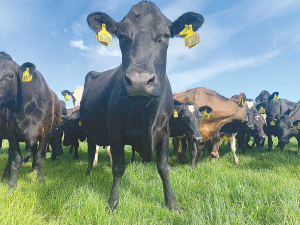Spelling pastures
To build resident populations of subterranean clover in hill country pastures, sheep farmers are encouraged to spell selected areas for four to five weeks over late spring and early summer if possible.
 Digestibility, a measure of pasture quality and nutritional value, is one of the most important factors for increasing milk or meat production.
Digestibility, a measure of pasture quality and nutritional value, is one of the most important factors for increasing milk or meat production.
A new high sugar grass now available in NZ has the potential to significantly lift animal production and reduce farmer’s environmental footprint.
That's according to seed company Germinal NZ.
Scientists have found the grass – AberGreen AR1 – has up to 5.5% higher digestibility levels than conventional varieties. Germinal claims it is the first perennial ryegrass in the country to offer close to an optimum balance of energy and protein, which means it is more digestible for livestock than conventional varieties.
Germinal general manager Sarah Gard explains that digestibility, a measure of pasture quality and nutritional value, is one of the most important factors for increasing milk or meat production.
“A digestibility gain of 1% is worth 3% of yield,” she says. “AberGreen AR1 has 5.5% higher digestibility than standard ryegrass varieties, which means they can absorb more energy from the feed.”
Gard claims this offers the potential for dairy cows, beef cattle and lambs to significantly increase production.
“I firmly believe that there are three pillars to a good ryegrass – yield, quality and persistence. There is little benefit in growing a lot of low quality feed.”
The new ryegrass is the latest addition to Germinal’s range of high sugar grasses, which are bred to produce a higher level of water-soluble carbohydrates (WSC), or sugar energy, than traditional ryegrass.
In an independent trial of New Zealand cultivars, AberGreen AR1 was found to have a 15.5% higher than average WSC level.
Increased sugar energy has proven to lift animal production with New Zealand research showing that lambs grazing high sugar grass finished 17% faster and 19% heavier than lambs grazing a conventional ryegrass variety.
“The high sugar content enables the microbes responsible for the breakdown of forage to operate more efficiently, so more protein is converted to meat and milk and less is excreted into the environment.”
Gard adds that the new grass is also very densely-tillered and provides superior ground cover compared with other ryegrasses.
“As a result, it has increased ability to withstand heavy grazing and pugging. The increased ground cover provides the plant with greater ability to capture light for photosynthesis and growth, restricting the invasion of weeds and unsown species.”
Gard also claims that AberGreen AR1 can help farmers reduce their environmental footprint.
“The extra soluble sugars can change rumen fermentation patterns, reducing methane emissions,” she explains. “A New Zealand trial reported 9% lower methane emissions from sheep fed high sugar grass, such as AberGreen AR1, when compared to a conventional variety.”
Gard adds that the improved use of ruminal protein can limit the amount of nitrogen lost in urine.
Overseas Trade Minister Todd McClay says he's working constructively with the Labour Party in the hope they will endorse the free trade agreement (FTA) with India when the agreement comes before Parliament for ratification.
Donald Trump's latest tariff tantrum has again thrown the world of trade into a new round of turmoil and uncertainty, and NZ is caught up in it.
The third edition of the NZ Dairy Expo, held in mid-February in Matamata, has shown that the KISS principle (keep it simple stupid) was getting a positive response from exhibitors and visitors alike.
Twenty years ago, South African dairy farm manager Louis Vandenberg was sent to a farm in Waikato to provide training on Afimilk technology.
Strong farmgate milk price is helping boost investment on farms, says PGG Wrightson chief executive Stephen Guerin.
Fonterra's 460 milk suppliers in Australia, who will switch to Lactalis end of this month, are unfazed with the impending change.

OPINION: A mate of yours truly reckons rural Manawatu families are the latest to suffer under what he calls the…
OPINION: If old Winston Peters thinks building trade relations with new nations, such as India, isn't a necessary investment in…